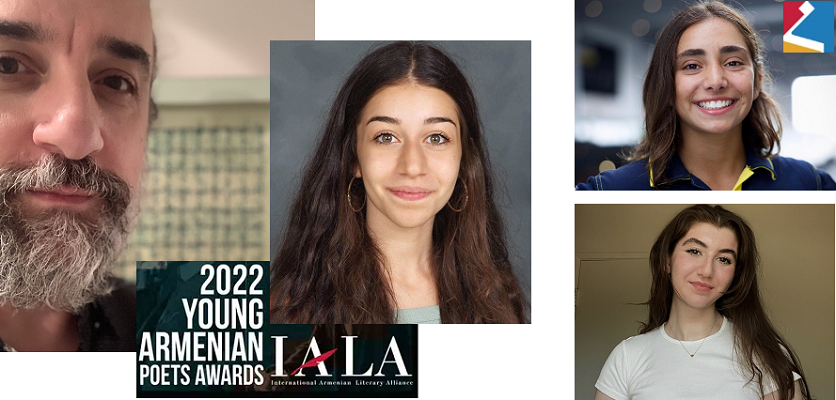IALA X h-pem | THE 2022 Young Armenian Poets Awards: Building Bridges
April 04, 2022 - October 02, 2022
“We all need a destination in which we might envision our work living.” In these words, Alan Semerdjian, Founder and Director of Young Armenian Poets Awards once again turns to h-pem to find an “authentic audience” for IALA’s (International Armenian Literary Alliance) annual awards.
These are turbulent times! While the soul of our nation is in turmoil, IALA taps into young talent and invites them to self-reflect by posing existential questions that beg for answers:
How can poetry serve as a bridge between Armenia and the over five million persons of full or partial Armenian ancestry living outside it today? What kinds of conversations might be necessary between Armenians and the world or across the diaspora itself?
Straight insights are not easy to come by. Yet, it’s fascinating to see how the young awardees dig deep into the topic and bring their own unique perspectives laced with symbolism, fantasy, and elegy. Fraught with the conflicts we all mediate internally, they guide us with empathy, love, and the hope of renewal.
Check out Semerdjian's whirling introduction to the 2022 YAPA below.
Follow the links in the article for a hauntingly beautiful poetic conversation we would all desire, especially during this critical and somber time in our history.
Each fall, I think of the spirit of Armenian independence. Although one of the world’s oldest civilizations with roots beyond its present-day borders dating back to almost four millennia, this is the 31st year of our second birth as a free republic in the modern sense of the term. The Armenian people have suffered much throughout history, and there is mobilization by enemies at the border yet again that threaten our freedom. Freedom has always threatened oppressive states. And while we know that all of us on the planet are not free if one nation, however small, is imprisoned by autocratic aggression and violation of international law, it seems like the global conversation around this notion is not always happening in the way that it should. And it also seems like it’s our life's work as Armenians to speak up for this idea that all of us matter equally.
Why must there always be this threat to our nation’s sovereignty? The answer to this question is often informed by the proximity of our admiration for and relationship to the homeland. Far and longing. Close and angry. In it and fearful. There are, it feels sometimes, as many Armenias as there are Armenians. Each of us is a satellite of love for the idea of our nation and our people. This is a kind of independence and even a form of liberation in this type of thinking, but it is also a kind of deep and inimical fracturing. In this way, Armenians are similar to other communities impacted by dispersion and movement over the centuries such as, most markedly, the massive and world-changing African and Asian diasporas for sure, but also the Northern Triangle Diaspora and the Jewish and Palestinian ones too. The history of our world might be defined by the ways in which we move apart from each other and the ways in which we reform and come together, and poetry has been and continues to be the conduit.
 IALA Presents the Emerging Writers Showcase. To access their virtual reading, click here on October 8.
IALA Presents the Emerging Writers Showcase. To access their virtual reading, click here on October 8.In her poem “Let’s Build a Bridge,” Yerevan poet Marine Petrossian tells her intended and imaginary readers “my country is not your country but maybe some of my dreams are your dreams also.” This thought—that we may be connected despite our distances and language fissures and political inclinations and cliffs and divides—is more critical to our survival and prosperity than it is a radical aesthetic. And it was the question we posed our young writers around the world this year. How can poetry serve as a bridge between Armenia and the over five million persons of full or partial Armenian ancestry living outside it today? What kinds of conversations might be necessary between Armenians and the world or across the diaspora itself?
The poems that were submitted to this year’s Young Armenian Poets Awards (written by teens aged 14-18 from all over the globe) were all tied together by this undeniable need to enter the conversation. They all had something to say, which is illustrative that we all want a bridge to be built and that we want to walk that bridge and sit and talk with each other in the middle, and all had meaningful and memorable ways to say it. Thank you to all who entered. This is no small thing. I want to also and once again thank the families and educators who had a hand in this as well as anyone who shared a flier or posted online or otherwise about our call for work. It’s a Herculean effort to get the word out there and there is no celebration without it. And as was the case last year, winners were selected but all submissions shined their own ineffable light.
.jpg) Alan Semerdjian is the Founder and Director of Young Armenian Poets Awards.
Alan Semerdjian is the Founder and Director of Young Armenian Poets Awards.Thank you to our judges—Gregory Djanikian, Armine Iknadossian, and Raffi Joe Wartanian—who had the challenging task of selecting three winners on the basis of “invention, technical skill, and the emergence of a unique voice or vision.” Their commitment to being careful and considerate readers for these young writers (and in some instances, first readers) is incredibly admirable. Without them, the roof collapses.
Thank you to Arthur Kayzakian and Olivia Katrandjian and the entire team at IALA who continue to make space for the Young Armenian Poets Awards among competing initiatives, and to Marine Petrossian for the invitation to build something together.
And finally, thank you to h-pem. As I’ve said before, the idea of an authentic audience for a maker is an essential part of the writing process. We all need a destination in which we might envision our work living. A special note of gratitude goes to h-pem and The Hamazkayin Armenian Educational and Cultural Society for providing that space and supporting our youth. This is undeniably important work.
How strong must the foundation of a bridge be to traverse miles of land? A sea? The air? Dreams and hopes? The process of building one always seemed inexplicable for me as a child and especially while crossing. But yet, here we are with these marvelous feats of the imagination and human perseverance all around us. We can do so many things if the need arises.
Recently, the EVN Report’s Maria Titizian wrote the following regarding the harrowing news of the possibility of more war: “Our generation will be judged by how we navigate these impossibly critical times, how we survive these threats to our existence and how we overcome the challenges. We must find our sense of purpose deeply anchored in our unity and strength and instead of pointing our verbal arrows at one another, we must come together in ways we never thought possible to preserve our independence, freedom and sovereignty.”
I truly believe that these students who entered our contest, and especially the three of whom I’m introducing here, are finding that purpose. They are extending the brave hand of empathy and lacing it in intellect and invention and serving us hope for the future—stunningly, bravely—as they speak to the other side of the imaginary bridge. They are inspirations for us all.
Hello, other side, they seem to say, here I am, and if it appears I am just as lost as you, then together we are found.
Check out the winning entries below
- Ani Apresyan: "In memory of the country we once recalled"
- Juliette Hagobian: "my letter to the missed armenian"
- Taleen Sahakian: "The Once-Man"
You can also check out Alan Semerdjian's profile on h-pem here
Join IALA for their virtual reading to highlight the works of emerging Armenian writers on October 8, 2022, at 10 am Pacific / 1 pm Eastern / 9 pm Yerevan time.
The event will feature readings by the winners of IALA’s 2022 Young Armenian Poets Awards.
Any additional references or recommendations? We would love to hear your suggestions!
Join our community and receive regular updates!
Join now!



Attention!